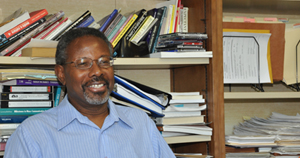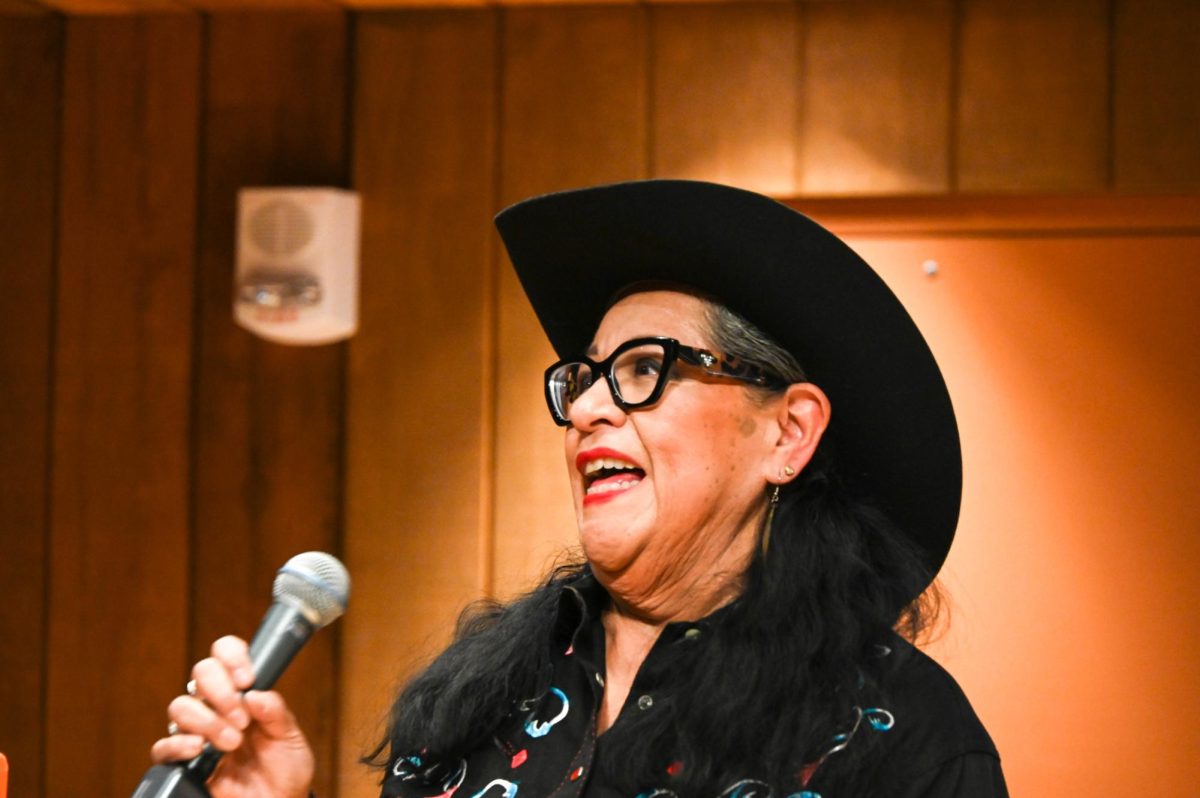Dr. Ewart Skinner, associate professor in the School of Media and Communication at Bowling Green State University (BGSU), pulled a large, leather-bound book from the top shelf of a filing cabinet near the door in his office. A collection of old newspapers was revealed inside its cover. They were written in both Arabic and English, and belonged to a volume of The Caravan, the newspaper he was managing editor of at The American University in Cairo, Egypt.
Skinner has been around the world: He was born and raised in Trinidad; studied abroad in London while in college in Missouri; read poetry in Germany, New York and at Kent State; established a newspaper in Tobago, West Indies for UNESCO and made numerous connections across several continents. But he remains admirably humble despite his travels and accomplishments, and said they are what keeps him grounded.
“My greatest achievement is living a balanced life with my feet on the ground,” Skinner said. “I hope that I have emerged from all my experiences as someone who is understanding and appreciative of the world, not arrogant.”
Skinner has worked at BGSU for 32 years and was chair of the Department of Telecommunications for eight. He plans to retire in Spring 2024. Before and during his time at the university, he attained a lengthy list of worldly experiences that some said sets him apart from the rest.
Jose Cardenas, teaching professor in the School of Media and Communication at BGSU, said Skinner has lived an incredible life, and his humility about it is commendable. They worked closely on numerous special projects, including creating a film called “Building Dreams” for the BGSU College of Arts and Sciences and traveling to Burkina Faso to do a documentary on African Film Director Gaston Kabore.
“If a student chooses to take a class with Dr. Skinner, they have so much to gain,” Cardenas said. “He has a lot of knowledge and provided a tremendous amount to the university over the years.”
Dr. Rebecca L. Skinner Green, associate professor in the School of Art at BGSU and Skinner’s wife, said he has an impressive resume. But rather than reveling in it, he used it to build a strong foundation of who he is and stay dedicated.
“He has a very international perspective on things around him,” she said. “He’s also a very thoughtful person, so he brings it all together in a meaningful way.”
Cardenas and Skinner Green said Skinner has done a lot. They both agreed he has great stories to tell, but also that he is often misunderstood. He still considers himself a “work in progress.”
“I’m not very successful,” Skinner said. “I thought I would have accomplished a lot more at the end of my career.”
Skinner said he faced a lot of adversity throughout his life, which contributed to his worldview. One such struggle was the death of his father when he was 15, which happened while they were on vacation in the U.S.
“That was a significant crossroads in my life,” Skinner said. “I had to adjust to a whole different environment.”
Skinner Green recounted this moment in Skinner’s life with reverence, and said she could not imagine making her own way in another country after that trauma. In fact, his new surroundings proved to be unforgiving in many ways. Trinidad is primarily a Black country, but Skinner shared that he dealt with some instances of discrimination after coming to the U.S.
“In the U.S., people try to put you down because you are Black,” he said. “I’m the only Black person in this department after being here for many, many years, which says to me that people aren’t aggressively interested in hiring African American scholars.”
Skinner admitted this has been a frustrating roadblock. He said his background makes him a better teacher, because his knowledge of the world, the people in it and how they interact helps him better understand the history and development of the country.
“Another thing people don’t understand is his dedication to his students and craft,” Skinner Green said. “I think a lot of people get surprised at how many things he’s done, and then they doubt it.”
She said anyone without Skinner’s self-confidence “would have broken a long time ago” in handling challenges like his. He said his relationships with his home country and people from all walks of life help him persevere.
“What has grounded me in all my struggles is my background,” Skinner said. “It influenced my sense of identity and kept me from feeling intimidated.”
Skinner plans to remain persistent once he leaves BGSU. He said he will ramp up his work with the Communication for Behavioral Impact (COMBI) Institute, which helps governments in low-income countries incorporate the World Health Organization’s strategies “to achieve concrete behavioral results in health and social development,” according to their website. He also said he has “a couple of books to get finished.”
“His presence will be missed,” Cardenas said. “He’s definitely leaving his mark here at BGSU.”
Skinner also said he looks forward to spending more time with his wife and two sons. He will continue pursuing his hobbies, which include playing guitar, writing poetry and cooking. He said he hopes he encouraged people to go out in the world and explore.
“Get a broad understanding of the world,” Skinner said. “Be grounded in that understanding, and work in a disciplined way toward your goals.”




















